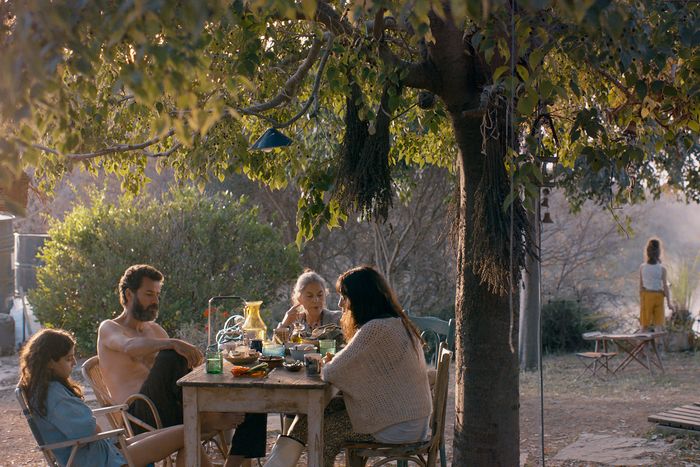
ÔÇ£Please, keep it civilized,ÔÇØ Lebanese government lackey Tarek (Fran├ºois Nour) says to the understandably furious Badri family after the administration starts work on a gigantic dump next door to their secluded and idyllic home in the countryÔÇÖs mountains. NourÔÇÖs bland delivery of such a condescending line captures the tragicomedy of Mounia AklÔÇÖs debut film, Costa Brava, Lebanon. Part family drama, part political statement, it asks at what point isolation becomes a selfish choice instead of a protective one, and if itÔÇÖs possible to love your country but also hide from it.
Costa Brava, Lebanon imagines a ÔÇ£near futureÔÇØ in which very little about the country has changed. Children speak about the 2020 Beirut explosion in hushed tones, like it was an apocalyptic event; expats who left Lebanon roll their eyes at the continued corruption of the nameless president. The economy is still bad, the environment is still being destroyed, the government is still unresponsive to its citizensÔÇÖ demands for more transparency and accountability. Akl regards these constants with deadpan humor and prickly anger, but sheÔÇÖs less interested in the forces infringing upon the Badris than in their varied responses to them. Costa Brava, Lebanon continues other Lebanese filmmakersÔÇÖ (in particular costar Nadine LabakiÔÇÖs 2018 drama Capernaum and Oualid MouanessÔÇÖs 1982) tradition of criticizing the government, and evokes the curdled whimsy of family portraits like Captain Fantastic and The Descendants. But the filmÔÇÖs graceful visuals, steady pace, and collaborative ensemble make AklÔÇÖs work her own.
The over-industrialized and heavily populated Beirut is where Costa Brava, Lebanon begins, and cinematographer Joe Saade and editors Carlos Marques-Marcet and Cyril Aris cleverly put together a series of pans to communicate how far from the capitalÔÇÖs cacophony their film will take place. Slowly, SaadeÔÇÖs camera moves across a port stacked with shipping containers to a flatbed truck carrying a large statue of a man. WeÔÇÖll follow the statueÔÇÖs transport through the city, along the coast, and on dusty roads until it passes a locked chain-link fence marked ÔÇ£Badri family ÔÇö private property.ÔÇØ Beirut was soundtracked by the droning sounds of construction and the chants of protestors, but here in the mountains, where the Badris have made their escape, the trees sway and the birds chirp. This is a place of stillness and solitude, and the family (at least at first) seems united in their desire for it to stay this way. Husband Walid (Saleh Bakri); his wife Souraya (Labaki); teen daughter Tala (Nadia Charbel); and tween daughter Rim (twins Geana and Ceana Restom, giving a combative, willful performance that brings to mind Rayan SarlakÔÇÖs turn in Hit the Road) harvest vegetables and play games around the dinner table together. When the dump moves in next door, they face off against it together, too.
But while Walid starts gathering video and photos of the dump workers, certain that theyÔÇÖll break their promise to recycle 80 percent of the trash, his family begins galvanizing in other ways. Souraya takes a renewed interest in the resistance in Beirut, and wonders what happened to the home they left behind eight years ago. Tala becomes curious about the men who work at the dump, while her grandmother Zeina (Liliane Chacar Knoury) encourages her to pursue an affair with one of them. Anxious Rim begins counting to certain numbers ÔÇö sometimes eight, sometimes 44 ÔÇö as if that might drive the dump workers away. TheyÔÇÖre four people against a force, and Costa Brava, Lebanon is uncompromising in rendering the helplessness of their circumstances.
The pastoral life that Akl depicted with tenderness steadily disappears, and the dump takes on a horror-movie quality. Its borders seem to expand as trash bags begin appearing on the BadrisÔÇÖ property, and shots of swarming flies and sooty skies turn practically malevolent. The symbolism here is pretty straightforward: the pollution creeping into the BadrisÔÇÖ bubble is toxic both literally and figuratively, did you get it? But Akl and Clara RoqetÔÇÖs script provides depth to these characters and immerses us in each of their perspectives and relationships ÔÇö which shift along lines of blood and love.
Despite all this calamity, Akl intersperses moments of sly humor into Walid and SourayaÔÇÖs marriage (WalidÔÇÖs disinterest could not be less convincing when Souraya says sheÔÇÖll call an ex for advice; he rolls his eyes through her entire phone conversation) and uses that banter to probe at the familyÔÇÖs fault lines. Actors Labaki and Bakri are at another level of expressivity and nuance separately and together, and their characters come to symbolize differing paths forward for their family and their country. Reconciliation or resistance, Akl asks. The filmÔÇÖs answer is a bittersweet surrender.
More Movie Reviews
- Flow Is an Animal Adventure ThatÔÇÖs Endearing and a Little Too Pretty
- Alien: Romulus Gets the Job Done, But at What Cost?
- Blitz Is the Worst Movie Steve McQueen Has Made


